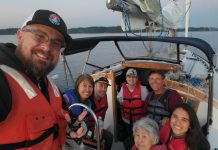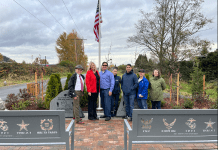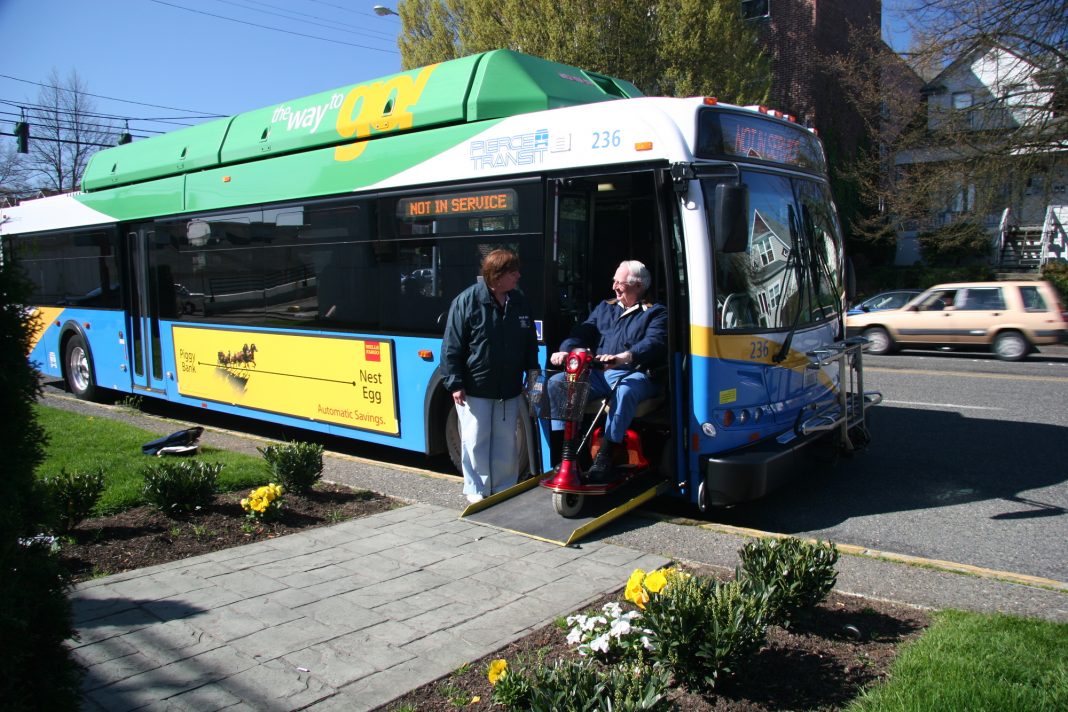We all need a little help charting a course from time to time, and this can be particularly true when it comes to public transportation. Do you know what resources are available to help you find your way? What buses go where and at what times? Which stops you need and whether they are north or southbound? As daunting as that sounds, do you think you could explain to someone else how to plan a trip? What about an elderly person, someone with a disability?
If you live in Pierce County, you can rest easy because Pierce Transit’s travel training program provides a helping hand to special needs commuters learning to navigate the bus system. In a nutshell, travel training consists of teaching riders how to use public transportation. Pierce Transit’s primary clientele includes people with disabilities and the elderly, although the department also works regularly with veterans, trains service animals and is working on expanding their services to include ESL clients as well.
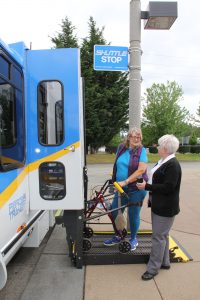
Through one-on-one or group training, power mobility device bus orientations and group educational outreach, Pierce Transit’s travel trainers help riders understand and execute trips via public transportation. Trainers accompany individuals on their journey until they know their route or have learned to use the bus system. This process may require several rides with the individual as well as a shadow period where the trainers follow riders in a car and even check in unannounced to ensure riders are doing alright down the road.
The primary goal of the travel training program is to increase independence for individuals with limited mobility.
Tim Renfro, ADA Administrator at Pierce Transit, offers a little insight into why Pierce Transit has adopted this service completely free-of-charge for community members. “Under the Americans with Disabilities Act, transit providers are expected to make their bus systems usable for people with disabilities. For many individuals we work with, they would be unable to travel independently without this training. Without these skills, they would be reliant on SHUTTLE paratransit service, which is much more costly to provide than bus service. So, there is an economical payoff as well.”
“Helping people get where they want to go offers more than just the ability to get from point A to point B,” says Frances Rankos, one of two full-time travel trainers that serve South Sound commuters. “It also offers inclusion in the community. Once people are able to get around, they’re able to participate in programs, be active members in a group or activity and sometimes find employment. The benefits of teaching someone to use the transit system safely extend far beyond just transportation.”
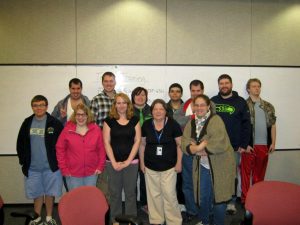
Photo courtesy: Pierce Transit
Frances and her colleague, Allison Berg, do a great majority of the actual travel training themselves, but Frances and Allison explain that outside support has helped spur the steady growth the program has seen over the years. Pierce Transit is able to offer this opportunity to riders with the help and support of parents or guardians, employment agencies and schools. “We’d like to give a shout out to drivers at Pierce Transit,” says Allison. “They are very supportive and help make this program a success.”
There is no blanket training for riders: each client has different needs, so the material they teach stays the same, but the delivery changes very much from person to person. Frances says sometimes the pair has to get a little creative when it comes to helping riders feel comfortable and safe on their trip. “We provide aids to help riders become independent. Supplemental information is created on an individual basis. I worked with an individual that was blind, and she wanted to know what a specific transit station looked like. No braille map or resources were available to help explain that, so I made a replica of the station to scale so she could get a sense of where it all was, and then we walked it.”
Occasionally the pair has helped riders get as far as Mukilteo or Ocean Shores via public transit, but the great majority of their work is done in the county. And both agree that, even though the work can require a lot of on-your-toes thinking, research and long hours, it’s the most rewarding work they’ve ever done. To illustrate their point, they say that Raymond is one of the best examples of how travel training is a rewarding and necessary service.
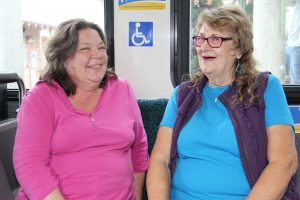
In 2013, the pair got a call from a woman. “You’ve got to help me do something about Raymond,” she said. Raymond had a stroke after retiring from the military. He had to give up his home, his job, and he moved in with family to make life easier. They got him a scooter, and he wanted to take part in a program at the Tacoma Area Coalition of Individuals with Disabilities (TACID), but there was no bus service for him to take in Graham.
“We tried different programs, but the times didn’t work for him,” the travel trainers remember. “So he started riding his scooter a mile and a half to the nearest bus stop. He went from Spanaway to the South Hill Mall, from here to downtown Tacoma and transferred to a bus that goes to TACID. And he’s been doing it every day since we trained him. Because of this program, he’s no longer housebound and his quality of life has, by all accounts, improved dramatically.”
If you know anyone who might be interested in taking advantage of Pierce Transit’s completely free travel training program, call 253-984-8208.
Pierce Transit partners with Catholic Community Services (CCS) to augment training by offering Bus Buddies. These are volunteers that travel with the elderly or people with disabilities on the bus system to help them feel more comfortable. To learn more about volunteering with the Bus Buddies program, contact Rusty Figley at 253-502-2741.
Sponsored





